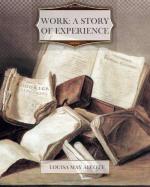Some of Mr. Fletcher’s attempts were comical, and some pathetic, for though the sacred circle of her wedding-ring was an effectual barrier against a look or word of love, Christie knew that the old affection was not dead, and it showed itself in his desire to win her respect by all sorts of small sacrifices and efforts at self-control. He would not use many of the comforts sent him, but insisted on wearing an army dressing-gown, and slippers that cost him a secret pang every time his eye was affronted by their ugliness. Always after an angry scene with his servant, he would be found going round among the men bestowing little luxuries and kind words; not condescendingly, but humbly, as if it was an atonement for his own shortcomings, and a tribute due to the brave fellows who bore their pains with a fortitude he could not imitate.
“Poor Philip, he tries so hard I must pity, not despise him; for he was never taught the manly virtues that make David what he is,” thought Christie, as she went to him one day with an unusually happy heart.
She found him sitting with a newly opened package before him, and a gloomy look upon his face.
“See what rubbish one of my men has sent me, thinking I might value it,” he said, pointing to a broken sword-hilt and offering her a badly written letter.
She read it, and was touched by its affectionate respect and manly sympathy; for the good fellow had been one of those who saved the Colonel when he fell, and had kept the broken sword as a trophy of his bravery, “thinking it might be precious in the eyes of them that loved him.”
“Poor Burny might have spared himself the trouble, for I’ve no one to give it to, and in my eyes it’s nothing but a bit of old metal,” said Pletcher, pushing the parcel away with a half-irritated, half-melancholy look.
“Give it to me as a parting keepsake. I have a fine collection of relics of the brave men I have known; and this shall have a high place in my museum when I go home,” said Christie, taking up the “bit of old metal” with more interest than she had ever felt in the brightest blade.
“Parting keepsake! are you going away?” asked Fletcher, catching at the words in anxious haste, yet looking pleased at her desire to keep the relic.
“Yes, I’m ordered to report in Washington, and start to-morrow.”
“Then I’ll go as escort. The doctor has been wanting me to leave for a week, and now I ’ve no desire to stay,” he said eagerly.
But Christie shook her head, and began to fold up paper and string with nervous industry as she answered:
“I am not going directly to Washington: I have a week’s furlough first.”
“And what is to become of me?” asked Mr. Fletcher, as fretfully as a sick child; for he knew where her short holiday would be passed, and his temper got the upper-hand for a minute.
“You should go home and be comfortably nursed: you’ll need care for some time; and your friends will be glad of a chance to give it I’ve no doubt.”




